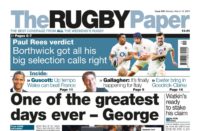 Friday night fever of the virulent Six Nations kind will break out again in Cardiff next month. France in Round Three on the last Friday of February will guarantee at least two all-too-familiar results. Live television numbers will go through the roof and fans clamouring for a late train home will be driven round the bend trying to find one.
Friday night fever of the virulent Six Nations kind will break out again in Cardiff next month. France in Round Three on the last Friday of February will guarantee at least two all-too-familiar results. Live television numbers will go through the roof and fans clamouring for a late train home will be driven round the bend trying to find one.
Cardiff is the undisputed capital of the Friday Night show. Far from seeking the title for its own self-aggrandisement, it has been foisted on the city as part of the relentless drive to take the tournament to an ever-expanding audience.
Like it or lump it, the Millennium Stadium has monopolised the Friday Six Nations matches to such an extent that all but one have been played there since the first, against England in 2010. France on February 26 will be the fifth and Ireland will be the sixth, next year.
Those legions of the Red Dragon Brotherhood who prefer their Test rugby on Saturday afternoons will feel more than a touch peeved. “Why,” they may well ask, “are we always lumbered with the Friday night fixtures? Does nobody else want them?''
Only one has been played elsewhere – in Paris in 2009, again involving Wales. Since then Twickenham, Murrayfield and the Aviva Stadium in Dublin have denied themselves the experience, almost as if a Friday home international is to be avoided like the plague.
The RFU have declared Twickenham a non-starter because the notorious Friday evening traffic inching westwards out of London would make it a logistical nightmare. In contrast, the WRU embraced the concept with enthusiasm but without appearing to worry unduly about the congestion around the biggest bottleneck on the M4, the Brynglas Tunnel.
Friday kick-offs mean fewer on Sundays and a glance at home fixtures for the six countries over the last ten seasons, including this one, substantiate the organisers' claim to be even-handed.
Wales have always tended to be up for something new. The first Sunday match in the old Five Nations, in April 1998 when the Arms Park was in the process of being converted into its wondrous 21st century successor, Wales went to Wembley and lost to France.
Lost, in the context of a 51-0 defeat orchestrated by a youthful Thomas Castaignede, still sounds like a euphemism for annihilation. Twelve months later, on another blazing Wembley Sunday, Wales were back at the old Empire Stadium famously ambushing England's Grand Slam chariot.
Once the broadcasters realised the potential to stretch one round of the championship into a three-day event and the organisers grasped the leverage to drive a harder bargain, the advent of the Friday Test became a matter of time.
The Millennium has produced some spectacular numbers. Official Six Nations figures say almost 11 million watched the France match two years ago on both sides of the Channel – the biggest audience of the entire Championship from a British venue.
Last year's Friday opener, Wales-England, attracted 7.5 million which the BBC claimed to have been more than they would have had on a Saturday.
Last year's wondrous finale, the Super Saturday to beat them all, drew a television audience which peaked for the England-France finale at 9.63 million. It was the most viewed match since the 2007 World Cup final, until the England-Wales match at HQ last autumn pushed the figure up to 11.6 million.
Whether ITV get anywhere near that for the Six Nations equivalent on March 12 remains to be seen. A 4pm kick off on a Saturday afternoon at least offers the battalions from west of Offa's Dyke the promise of getting back across the border that night.


























